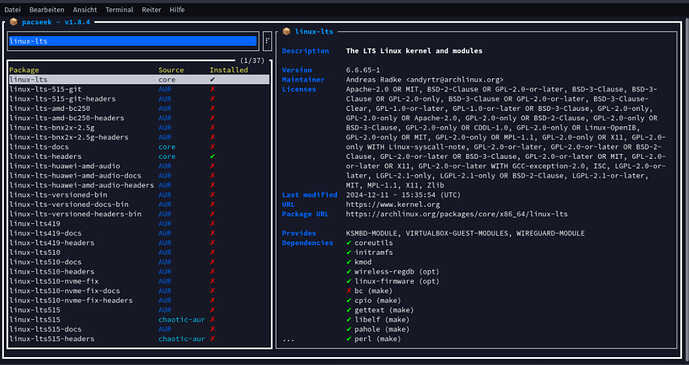Hey @all,
why I’m here
I’m new to Garuda and I’m on my way to completely switch from Win 10 to Garuda, mainly for gaming and working on light office tasks, etc.
why do I post this issue
I search for your help to get my controller working.
I hope to find the culprit and hope that my PC with 7 years old hardware is not getting too old now…
what have I done before I post here
I installed Garuda a few weeks ago and don’t know if I did something wrong, so I did a fresh install of Garuda.
I updated my system with the Garuda Welcome Assistant.
I searched the web, forums and wiki to get a solution.
The most issues about the same or similar topic are a few years old (2016 to 2023) and the solution most of the time was an system update to the current version…
what is my problem
I want to connect my Stadia Controller with my PC via bluetooth, but it is not possible.
Yes, the bluetooth mode is enabled and the controller is working on other devices (Android Smartphone, SteamDeck, Surface Go (Win10)).
I got six different Stadia Controllers and all are working fine with other devices.
what have I done to fix the problem
After I tried to connect my Controller with the system settings → bluetooth I only got an error message without good informations (“There was en Error during Setup deivce XX”), so I used
bluetoothctl → scan on → pair with [MAC ADRESS]
My controller is found, but does not connect and I get this error message:
[bluetooth]# Failed to pair: org.bluez.Error.AuthenticationCanceled
Here is the output:
╭─chris@Isboks in ~
╰─λ bluetoothctl
[bluetooth]# Agent registered
[bluetooth]# scan on
[bluetooth]# SetDiscoveryFilter success
[bluetooth]# Discovery started
[bluetooth]# [CHG] Controller XX:XX:01 Discovering: yes
[bluetooth]# [CHG] Device XX:XX:02 RSSI: 0xffffffd1 (-47)
[bluetooth]# [CHG] Device XX:XX:02 TxPower: 0xfffffff8 (-8)
[bluetooth]# [CHG] Device XX:XX:03 RSSI: 0xffffffd4 (-44)
[bluetooth]# [CHG] Device XX:XX:03 RSSI: 0xffffffd6 (-42)
[bluetooth]# pair XX:XX:02
Attempting to pair with XX:XX:02
[StadiaHSQP-73ec]# [CHG] Device XX:XX:02 Connected: yes
[bluetooth]# [CHG] Device XX:XX:02 Connected: no
[bluetooth]# Failed to pair: org.bluez.Error.AuthenticationCanceled
[bluetooth]# [CHG] Device XX:XX:02 WakeAllowed: yes
Garuda-inix output
╭─chris@Isboks in ~
╰─λ garuda-inxi
System:
Kernel: 6.12.4-zen1-1-zen arch: x86_64 bits: 64 compiler: gcc v: 14.2.1
clocksource: tsc avail: hpet,acpi_pm
parameters: BOOT_IMAGE=/@/boot/vmlinuz-linux-zen
root=UUID=9398512b-020f-44b1-a0f1-0b3c53af6144 rw rootflags=subvol=@
quiet loglevel=3 ibt=off
Desktop: KDE Plasma v: 6.2.4 tk: Qt v: N/A info: frameworks v: 6.9.0
wm: kwin_wayland vt: 1 dm: SDDM Distro: Garuda base: Arch Linux
Machine:
Type: Desktop System: ASUS product: All Series v: N/A
serial: <superuser required>
Mobo: ASUSTeK model: STRIX X99 GAMING v: Rev 1.xx
serial: <superuser required> part-nu: All uuid: <superuser required>
UEFI: American Megatrends v: 2101 date: 07/10/2019
CPU:
Info: model: Intel Core i7-6850K bits: 64 type: MT MCP arch: Broadwell
gen: core 6 level: v3 note: check built: 2015-18 process: Intel 14nm
family: 6 model-id: 0x4F (79) stepping: 1 microcode: 0xB000040
Topology: cpus: 1x dies: 1 clusters: 6 cores: 6 threads: 12 tpc: 2
smt: enabled cache: L1: 384 KiB desc: d-6x32 KiB; i-6x32 KiB L2: 1.5 MiB
desc: 6x256 KiB L3: 15 MiB desc: 1x15 MiB
Speed (MHz): avg: 3508 min/max: 1200/4000 scaling: driver: intel_cpufreq
governor: performance cores: 1: 3508 2: 3508 3: 3508 4: 3508 5: 3508 6: 3508
7: 3508 8: 3508 9: 3508 10: 3508 11: 3508 12: 3508 bogomips: 86341
Flags: avx avx2 ht lm nx pae sse sse2 sse3 sse4_1 sse4_2 ssse3
Vulnerabilities: <filter>
Graphics:
Device-1: Advanced Micro Devices [AMD/ATI] Navi 31 [Radeon RX 7900 XT/7900
XTX/7900 GRE/7900M] vendor: Sapphire NITRO+ driver: amdgpu v: kernel
arch: RDNA-3 code: Navi-3x process: TSMC n5 (5nm) built: 2022+ pcie:
gen: 3 speed: 8 GT/s lanes: 16 link-max: gen: 4 speed: 16 GT/s ports:
active: DP-1,HDMI-A-1 empty: DP-2,HDMI-A-2,Writeback-1 bus-ID: 03:00.0
chip-ID: 1002:744c class-ID: 0300
Display: wayland server: X.org v: 1.21.1.15 with: Xwayland v: 24.1.4
compositor: kwin_wayland driver: X: loaded: amdgpu
unloaded: modesetting,radeon alternate: fbdev,vesa dri: radeonsi
gpu: amdgpu d-rect: 3640x3360 display-ID: 0
Monitor-1: DP-1 pos: bottom-r res: 2560x1440 size: N/A modes: N/A
Monitor-2: HDMI-A-1 pos: primary,top-left res: 1080x1920 size: N/A
modes: N/A
API: EGL v: 1.5 hw: drv: amd radeonsi platforms: device: 0 drv: radeonsi
device: 1 drv: swrast gbm: drv: kms_swrast surfaceless: drv: radeonsi
wayland: drv: radeonsi x11: drv: radeonsi
API: OpenGL v: 4.6 compat-v: 4.5 vendor: amd mesa v: 24.3.1-arch1.3
glx-v: 1.4 direct-render: yes renderer: AMD Radeon RX 7900 XTX (radeonsi
navi31 LLVM 18.1.8 DRM 3.59 6.12.4-zen1-1-zen) device-ID: 1002:744c
memory: 23.44 GiB unified: no display-ID: :1.0
API: Vulkan v: 1.4.303 layers: 10 device: 0 type: discrete-gpu name: AMD
Radeon RX 7900 XTX (RADV NAVI31) driver: N/A device-ID: 1002:744c
surfaces: xcb,xlib,wayland device: 1 type: cpu name: llvmpipe (LLVM
18.1.8 256 bits) driver: N/A device-ID: 10005:0000
surfaces: xcb,xlib,wayland
Audio:
Device-1: Intel C610/X99 series HD Audio vendor: ASUSTeK
driver: snd_hda_intel v: kernel bus-ID: 00:1b.0 chip-ID: 8086:8d20
class-ID: 0403
Device-2: Advanced Micro Devices [AMD/ATI] Navi 31 HDMI/DP Audio
driver: snd_hda_intel v: kernel pcie: gen: 3 speed: 8 GT/s lanes: 16
link-max: gen: 4 speed: 16 GT/s bus-ID: 03:00.1 chip-ID: 1002:ab30
class-ID: 0403
Device-3: Trust USB microphone driver: hid-generic,snd-usb-audio,usbhid
type: USB rev: 1.1 speed: 12 Mb/s lanes: 1 mode: 1.1 bus-ID: 2-10.4:9
chip-ID: 145f:02d9 class-ID: 0300 serial: <filter>
API: ALSA v: k6.12.4-zen1-1-zen status: kernel-api with: aoss
type: oss-emulator tools: N/A
Server-1: PipeWire v: 1.2.7 status: active with: 1: pipewire-pulse
status: active 2: wireplumber status: active 3: pipewire-alsa type: plugin
4: pw-jack type: plugin tools: pactl,pw-cat,pw-cli,wpctl
Network:
Device-1: Intel Ethernet I218-V vendor: ASUSTeK driver: e1000e v: kernel
port: f000 bus-ID: 00:19.0 chip-ID: 8086:15a1 class-ID: 0200
IF: eno1 state: down mac: <filter>
Device-2: Qualcomm Atheros QCA6174 802.11ac Wireless Network Adapter
vendor: ASUSTeK driver: ath10k_pci v: kernel pcie: gen: 1 speed: 2.5 GT/s
lanes: 1 bus-ID: 07:00.0 chip-ID: 168c:003e class-ID: 0280 temp: 57.0 C
IF: wlp7s0 state: down mac: <filter>
Device-3: ASIX AX88179 Gigabit Ethernet driver: cdc_ncm type: USB rev: 3.2
speed: 5 Gb/s lanes: 1 mode: 3.2 gen-1x1 bus-ID: 6-1:2 chip-ID: 0b95:1790
class-ID: 0a00 serial: <filter>
IF: enp8s0u1c2 state: up speed: N/A duplex: half mac: <filter>
Info: services: NetworkManager, smbd, systemd-timesyncd, wpa_supplicant
Bluetooth:
Device-1: ASUSTek Qualcomm Bluetooth 4.1 driver: btusb v: 0.8 type: USB
rev: 1.1 speed: 12 Mb/s lanes: 1 mode: 1.1 bus-ID: 2-10.1:8
chip-ID: 0b05:1825 class-ID: e001
Report: btmgmt ID: hci0 rfk-id: 0 state: up address: <filter> bt-v: 4.1
lmp-v: 7 status: discoverable: no pairing: no class-ID: 6c0104
Drives:
Local Storage: total: 953.87 GiB used: 23.79 GiB (2.5%)
SMART Message: Unable to run smartctl. Root privileges required.
ID-1: /dev/nvme0n1 maj-min: 259:0 vendor: Samsung model: SSD 960 PRO 1TB
size: 953.87 GiB block-size: physical: 512 B logical: 512 B speed: 31.6 Gb/s
lanes: 4 tech: SSD serial: <filter> fw-rev: 1B6QCXP7 temp: 31.9 C
scheme: GPT
Partition:
ID-1: / raw-size: 953.57 GiB size: 953.57 GiB (100.00%)
used: 23.79 GiB (2.5%) fs: btrfs dev: /dev/nvme0n1p2 maj-min: 259:2
ID-2: /boot/efi raw-size: 300 MiB size: 299.4 MiB (99.80%)
used: 584 KiB (0.2%) fs: vfat dev: /dev/nvme0n1p1 maj-min: 259:1
ID-3: /home raw-size: 953.57 GiB size: 953.57 GiB (100.00%)
used: 23.79 GiB (2.5%) fs: btrfs dev: /dev/nvme0n1p2 maj-min: 259:2
ID-4: /var/log raw-size: 953.57 GiB size: 953.57 GiB (100.00%)
used: 23.79 GiB (2.5%) fs: btrfs dev: /dev/nvme0n1p2 maj-min: 259:2
ID-5: /var/tmp raw-size: 953.57 GiB size: 953.57 GiB (100.00%)
used: 23.79 GiB (2.5%) fs: btrfs dev: /dev/nvme0n1p2 maj-min: 259:2
Swap:
Kernel: swappiness: 133 (default 60) cache-pressure: 100 (default) zswap: no
ID-1: swap-1 type: zram size: 31.25 GiB used: 0 KiB (0.0%) priority: 100
comp: zstd avail: lzo-rle,lzo,lz4,lz4hc,deflate,842 max-streams: 12
dev: /dev/zram0
Sensors:
System Temperatures: cpu: 27.0 C mobo: N/A gpu: amdgpu temp: 42.0 C
mem: 36.0 C
Fan Speeds (rpm): N/A gpu: amdgpu fan: 0
Info:
Memory: total: 32 GiB available: 31.25 GiB used: 5.15 GiB (16.5%)
Processes: 361 Power: uptime: 1h 19m states: freeze,mem,disk suspend: deep
avail: s2idle wakeups: 0 hibernate: platform avail: shutdown, reboot,
suspend, test_resume image: 12.49 GiB services: org_kde_powerdevil,
power-profiles-daemon, upowerd Init: systemd v: 257 default: graphical
tool: systemctl
Packages: pm: pacman pkgs: 2044 libs: 594 tools: octopi,paru Compilers:
clang: 18.1.8 gcc: 14.2.1 Shell: garuda-inxi default: fish v: 3.7.1
running-in: konsole inxi: 3.3.36
Garuda (2.6.26-1):
System install date: 2024-12-21
Last full system update: 2024-12-21 ↻
Is partially upgraded: No
Relevant software: snapper NetworkManager dracut
Windows dual boot: No/Undetected
Failed units:
Thanks in advance
0point0


